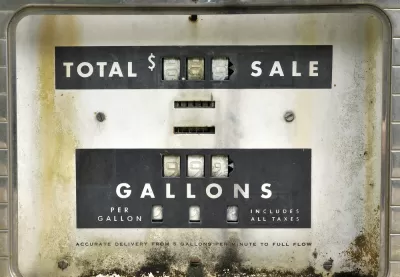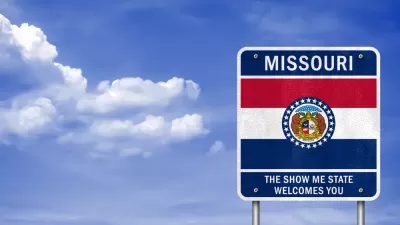Missouri legislators approved a bill at the end of the legislative session to place a 10-cents per gallon gas tax increase on the ballot to fund road repair. It had the support of Gov. Mike Parson but was rejected by nearly 54 percent of voters.

Proposition D, one of seven measures on last Tuesday's ballot in Missouri, asked voters to "increase the motor fuel tax by two and one-half cents per gallon annually for four years beginning July 1, 2019," according to the Secretary of State's office.
If passed, this measure will generate at least $288 million annually to the State Road Fund to provide for the funding of Missouri state law enforcement and $123 million annually to local governments for road construction and maintenance.
Constitutional restrictions and contrast with California
Missouri's gas tax, at 17.35-cents per gallon, is the second lowest in the nation after Alaska. Gas prices, averaging $2.39 per gallon, according to Gas Buddy, are the sixth lowest in the nation.
By contrast, California voters last Tuesday, by slightly more than the percentage that rejected Missouri's 10-cents increase, voted against repealing a 12-cent increase in the gas tax and 20-cents increase in the diesel tax. What makes the contrast so startling is that California's gas tax of 55.53 cents per gallon is the nation's second highest, and gas prices, averaging $3.71, are the nation's second highest.
"Proposition D was on the ballot due to constitutional requirements for voter approval of any tax increase above a certain threshold," writes Kevin Pula for the National Conference of State Legislators. The Associated Press indicated that a constitutional amendment approved by voters in 1996 required the legislature to place the authorizing legislation, House Bill 1460 [pdf], before the voters for final approval. AP notes that no general tax has been approved since then.
Had the California gas tax repeal initiative, Proposition 6, passed, that constitutional restriction would have applied to future increases to transportation taxes and fees in California as well.
Another similarity: both states last passed incremental tax increases around the same time, and then went for a generation without increasing it.
- The Missouri legislature passed a phased-in 6-cent per gallon increase in the motor fuel tax in 1992 with the last increase in 1996.
- Californians approved Prop. 111, a phased 9-cent increase, with the last increment in 1994.
Complicated ballot measure?
Proposition D did not simply ask voters to increase the gas tax to pay for road upkeep. As noted above, the revenue would be used to fund law enforcement. FOX 4 news reporter Alana LaFlore explains in the source article and in the accompanying news video.
Money would have gone to the State Road Fund, which supports the Missouri State Highway Patrol. MoDOT is funded from the same pot, and so the money would be freed up for road projects.
That scheme upset Crosby Kemper, Director of the Kansas City Public Library, who "says he planned to vote for Prop D but decided against it at the last minute," adds LaFlore.
"I just said this is crazy," Kemper said. "This is very badly written. I don't know why this says it`s for law enforcement, but it`s supposed to be for roads."
The "freed-up" money would apparently come from the state's General Fund which would be directed to a new Emergency State Freight Bottleneck Fund. But wait, there's more to confuse the voter.
The title of the proposition is Gas Tax Increase, Olympic Prize Tax Exemption, and Traffic Reduction Fund Measure. It seems that exempting prizes for Special Olympics, Paralympics, and Olympics from state taxes was a major aspect of the legislation.
An opponent took the matter to court, "claiming the referendum violated the Missouri Constitution because the measure’s wording deals with two topics," reported Jack Suntrup for the St. Louis Post-Dispatch. "A state appeals court in Kansas City on [Sept. 4] dismissed the lawsuit."
Steve Pokin, Springfield News-Leader columnist, reported about the complications at great length and with great exasperation on June 27. "What a mess this initiative is!" he wrote.
Finally, it should be noted that when the legislature passed the bill asking voters to approve a hike in the gas tax, they also passed legislation to cut corporate and income taxes. Gas tax opponents are quick to point to the regressive aspect of user fees. The Missouri legislature's actions justify that criticism.
What's next?
"It is unknown what the response will be within the state legislature, " adds Pula of the National Conference of State Legislators. "However, it’s a good bet that transportation funding will return to the chamber floors in some fashion, albeit carrying a scarlet letter from the voters."
In August 2014, the legislature placed Amendment 7, a temporary 0.75 percent increase on the state sales and use tax to fund transportation projects, on the ballot. The measure was rejected by a greater share of the voters – 59 percent [See additional posts tagged Amendment 7.]
Related in Planetizen
- Californians Vote to Maintain Roads and Transit by Rejecting Gas Tax Repeal, Nov. 9
- Election 2018 Results: Local and State Land Use, Transportation, Housing, and Infrastructure, Nov. 7
-
Missouri Lawmakers Hate Tolls, March 30, 2017
-
Missouri Still Searching for Transportation Funding Answers, January 28, 2016
FULL STORY: Missouri voters once again reject gas tax increase to improve roads

Maui's Vacation Rental Debate Turns Ugly
Verbal attacks, misinformation campaigns and fistfights plague a high-stakes debate to convert thousands of vacation rentals into long-term housing.

Planetizen Federal Action Tracker
A weekly monitor of how Trump’s orders and actions are impacting planners and planning in America.

In Urban Planning, AI Prompting Could be the New Design Thinking
Creativity has long been key to great urban design. What if we see AI as our new creative partner?

King County Supportive Housing Program Offers Hope for Unhoused Residents
The county is taking a ‘Housing First’ approach that prioritizes getting people into housing, then offering wraparound supportive services.

Researchers Use AI to Get Clearer Picture of US Housing
Analysts are using artificial intelligence to supercharge their research by allowing them to comb through data faster. Though these AI tools can be error prone, they save time and housing researchers are optimistic about the future.

Making Shared Micromobility More Inclusive
Cities and shared mobility system operators can do more to include people with disabilities in planning and operations, per a new report.
Urban Design for Planners 1: Software Tools
This six-course series explores essential urban design concepts using open source software and equips planners with the tools they need to participate fully in the urban design process.
Planning for Universal Design
Learn the tools for implementing Universal Design in planning regulations.
planning NEXT
Appalachian Highlands Housing Partners
Mpact (founded as Rail~Volution)
City of Camden Redevelopment Agency
City of Astoria
City of Portland
City of Laramie





























